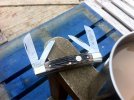Absolutely they are doing a disservice.
It's at the least confusing, and essentially deceptive.
But it also is doing themselves a disservice.
I, for one, just don't buy Boker knives.
Why should I have to keep an old catalog for years to prove where the knife was made? Or why should I have to do serious legwork to buy a used knife that says "Germany" but was really made in China?
It's total nonsense in my humble opinion.
Getting some materials from a different country is one thing, like South American wood, or bone. (like Case does).
But having the whole thing made elsewhere and then basically boxed in Germany and marked "German made" is ridiculous.
The sad thing is, unless they actually start stamping them "Made in USA" or "Made in Germany" or "Made in China" then I won't be buying one, they've already muddied the waters to much to simple put "USA" or "Germany" on them.
It's at the least confusing, and essentially deceptive.
But it also is doing themselves a disservice.
I, for one, just don't buy Boker knives.
Why should I have to keep an old catalog for years to prove where the knife was made? Or why should I have to do serious legwork to buy a used knife that says "Germany" but was really made in China?
It's total nonsense in my humble opinion.
Getting some materials from a different country is one thing, like South American wood, or bone. (like Case does).
But having the whole thing made elsewhere and then basically boxed in Germany and marked "German made" is ridiculous.
The sad thing is, unless they actually start stamping them "Made in USA" or "Made in Germany" or "Made in China" then I won't be buying one, they've already muddied the waters to much to simple put "USA" or "Germany" on them.








